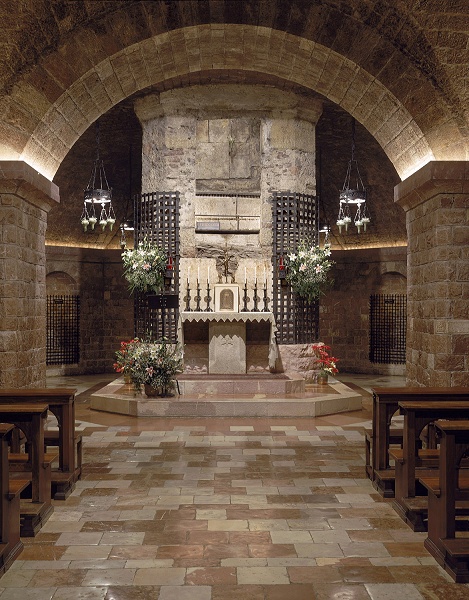Heart And Soul: San Francesco d'Assisi
Saint Francis of Assisi
Francesco was born in a wealthy family of Assisi, in Umbria, in 1181 or 1182, as Giovanni di Pietro di Bernardone. His father renamed him in homage to France. He had a bustling youth, even taking part in the war between Assisi and Perugia. He remained in prison for a year after the defeat, got seriously ill and was freed after his father paid a ransom. He started changing during his captivity. After recovering, he was planning to take part in a crusade to Jerusalem when he had a dream in Spoleto that changed the course of his life.

He then spent a lot of time in churches, chapels and in the nature. While praying in San Damiano church he heard the great rood asking him to restore the church, which he did, soon deciding to live in total poverty, renouncing his father and his patrimony. His life would be dedicated to God from now on, preaching, helping the poor and taking care of the lepers, all charity and joy. He was soon joined by followers and the community lived as "lesser brothers". In 1209 Francesco went to Rome with his brothers to seek permission from the Pope to found a new religious order, the Order of Friars Minor, commonly known as the Franciscans. The order grew quickly and in 1211 he and Chiara d'Assisi established the Order of Poor Dames or Poor Clares.

He travelled a lot and so did his brothers, and the congregations developped throughout Europe. In 1219, he met - and greatly impressed - the sultan in Damietta to promote peace between christians and muslims. In 1222, Francesco founded a third order for people who were not members of the clergy, the Secular Third Order. In 1224, he received the Stigmata. He died two years later on 3 October 1226, by the small church of the Porziuncola close to Assisi.

Francesco set up the first Christmas live Nativity scene and wrote several texts - prayers, rules, benedictions, letters... - among them the famous "Canticle of the Sun":
Altissimu, onnipotente bon Signore,
Tue so' le laude, la gloria e l'honore et onne benedictione.
Ad Te solo, Altissimo, se konfano,
et nullu homo ène dignu te mentovare.
Laudato sie, mi' Signore cum tucte le Tue creature,
spetialmente messor lo frate Sole,
lo qual è iorno, et allumini noi per lui.
Et ellu è bellu e radiante cum grande splendore:
de Te, Altissimo, porta significatione.
Laudato si', mi Signore, per sora Luna e le stelle:
il celu l'ài formate clarite et pretiose et belle.
Laudato si', mi' Signore, per frate Vento
et per aere et nubilo et sereno et onne tempo,
per lo quale, a le Tue creature dài sustentamento.
Laudato si', mi Signore, per sor'Acqua.
la quale è multo utile et humile et pretiosa et casta.
Laudato si', mi Signore, per frate Focu,
per lo quale ennallumini la nocte:
ed ello è bello et iocundo et robustoso et forte.
Laudato si', mi Signore, per sora nostra matre Terra,
la quale ne sustenta et governa,
et produce diversi fructi con coloriti fior et herba.
Laudato si', mi Signore, per quelli che perdonano per lo Tuo amore
et sostengono infermitate et tribulatione.
Beati quelli ke 'l sosterranno in pace,
ka da Te, Altissimo, sirano incoronati.
Laudato si' mi Signore, per sora nostra Morte corporale,
da la quale nullu homo vivente pò skappare:
guai a quelli ke morrano ne le peccata mortali;
beati quelli ke trovarà ne le Tue sanctissime voluntati,
ka la morte secunda no 'l farrà male.
Laudate et benedicete mi Signore et rengratiate
e serviateli cum grande humilitate.
More info:

